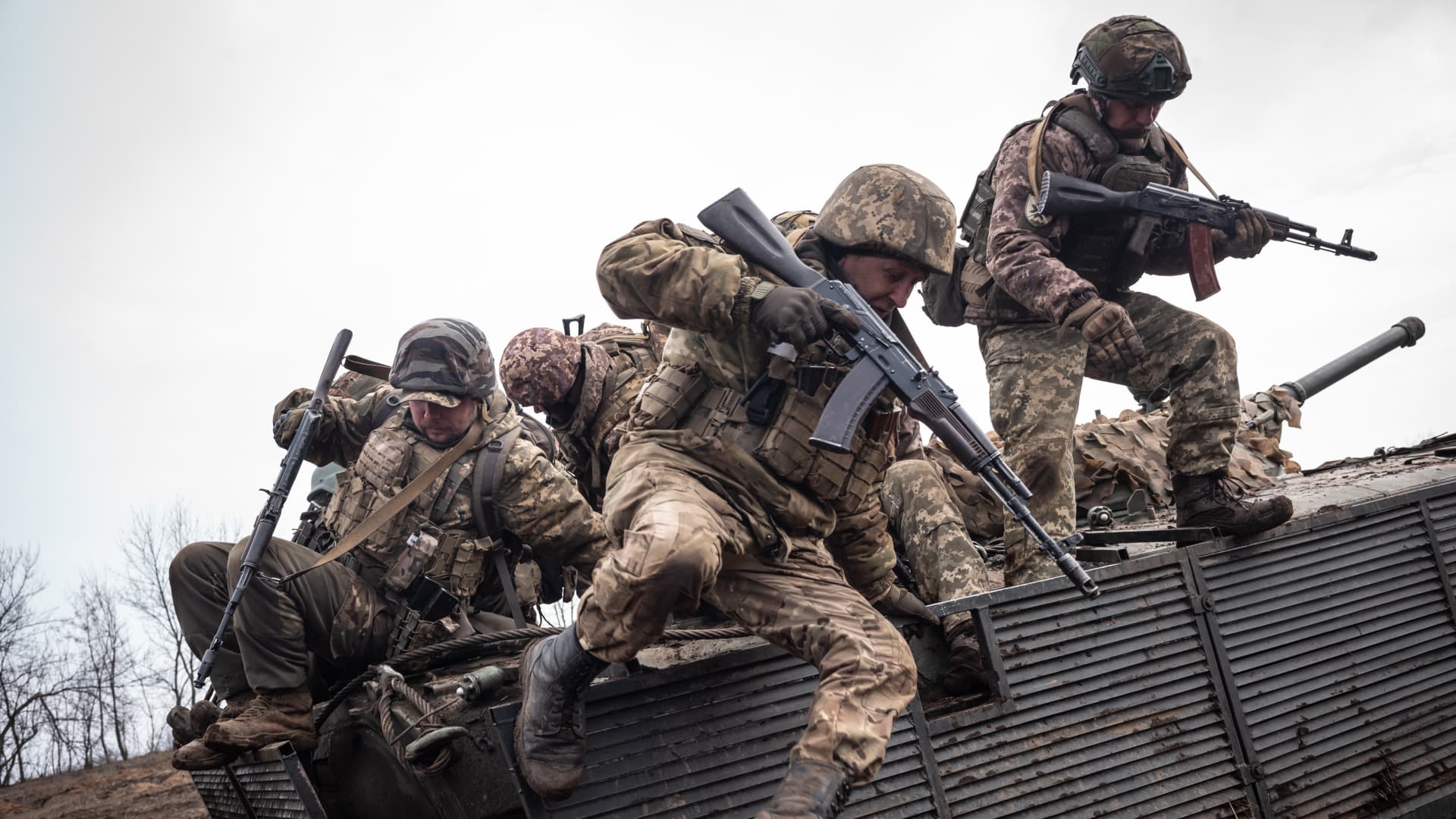Ukraine can keep on fighting Russia — but the ‘victory’ it wants might be out of reach

Ukrainian servicemen practice combat drills involving a BMP-1 in Donbas, Ukraine as Russia-Ukraine war continues on March 19, 2024.
Anadolu | Anadolu | Getty Images
With yet another tranche of U.S. aid on its way to Ukraine, Kyiv can breathe a sigh of relief that its forces will receive new weapons supplies and equipment to keep fighting Russia’s advancing forces.
But, with future aid uncertain, analysts question what “victory” Ukraine could realistically achieve against Russia — a country that has put its industries on a war footing and is able to mobilize hundreds of thousands more men to war.
While additional aid allows Ukraine to keep on fighting Russian forces in the short stretch, a “victory” in the near-term is an unlikely prospect. What’s more, what “victory” looks like for Ukraine, or its allies, could be a source of friction.
“While renewed U.S. military support will likely avert a potential military defeat in 2024, the past several months have clearly demonstrated the perils of Kyiv’s (over)dependence on U.S. military aid,” Andrius Tursa, Central and Eastern Europe advisor at consultancy firm Teneo, said in emailed comments on Tuesday.
“There is also a lack of common vision between Kyiv and its allies about what a Ukrainian ‘victory’ means and what steps and resources would be needed to achieve it,” he noted.
“Officially, Kyiv still aims to liberate all of the territories occupied since 2014, but few find this is realistic in the near-to-medium term.”
Russian President and presidential candidate Vladimir Putin addresses the crowd during a rally and a concert celebrating the 10th anniversary of Russia’s annexation of Crimea at Red Square in Moscow on March 18, 2024.
Natalia Kolesnikova | Afp | Getty Images
Discussions about alternative settlement options acceptable to Kyiv might pick up later in 2024, Tursa said, particularly “as the share of the Ukrainian population that is willing to consider territorial concessions in exchange for the cessation of hostilities/peace is consistently rising.”
Kyiv insists that it will liberate all of its territory that Russia has seized since 2014. That includes Crimea and four Ukrainian regions Russia illegally annexed in 2022, which it has since sought to “Russify” by handing out Russian passports, pensions and benefits while erasing Ukrainian culture, history and language from public spaces and schools.
Russia’s leadership has effectively staked its authority, legitimacy and legacy on winning in Ukraine and is unlikely to voluntarily remove its troops from southern and eastern Ukraine. This is particularly the case in eastern Ukraine, where it has enjoyed support from pro-Russian separatists for over a decade.
Frankness needed
Analysts say an “honest” conversation needs to take place between allies and Ukraine to map out what a victory might look like, along with what concessions and compromises might need to be made in any peace settlement or ceasefire.
“I want to see the liberation of [Russian]-occupied territory but that’s very hard to do, at least at this moment. So we need to speak about this with our partners and to have this unity with our partners,” Oleksandr Musiyenko, a Kyiv-based military expert and head of the Centre for Military and Legal Studies, said.
The morale boost from the U.S.’ latest injection of aid means there is currently little appetite among Ukraine’s leadership to discuss a potential end of the war that doesn’t involve outright victory, said Musiyenko.
“Here in Ukraine, people and politicians, they’re feeling a little bit sensitive when talking about this, but I am sure that we need to be honest with the Ukrainian people and also with our Western partners, that’s very important,” he told CNBC Wednesday.
A woman walks past a huge poster depicturing a Russian soldier and a Z letter – a tactical insignia of Russian troops in Ukraine, in Sevastopol, Crimea, on April 23, 2022. The “Z”, which has become a symbol of support for Russian military action in Ukraine, is widely used by Russian authorities and President Putin supporters, decorating building facades, bus doors, car windscreens and T-shirts.
– | Afp | Getty Images
Ukraine’s best case would be to liberate all of its territory from Russian troops and to join NATO and the EU, “but I’m sure that we need to speak about different scenarios,” Musiyenko said. Much could depend on what difference the U.S.’ latest $61 billion aid package, and the weapons and equipment it gives to Ukraine, makes on the battlefield — and how much future support Ukraine receives after the U.S. presidential election later this year.
If Russian forces could be weakened, depleted and pushed back in the coming months, particularly in the southern Kherson and Zaporizhzhia regions, then that could open a space for talks and an ally-backed cease-fire, according to Musiyenko. This also depends on Ukraine receiving robust security and defense guarantees.
In such a scenario, there could be a balance of powers of sorts, he said, in what could ultimately become a prolonged, albeit uneasy, cease-fire.
“[In such a scenario] Ukrainians will not have so much power to liberate old territory, according to the international border, and Russians will not have so much power to occupy more territory,” he said.
Ukraine would never recognize occupied territory as belonging to Russia, Musiyenko said, but a cease-fire would bide the country time. “So in this scenario, Ukraine will keep independence and sovereignty, Western support will be high and we can communicate with our partners,” he said.
“We will never agree that this [occupied territory] could be a Russian territory. No one will agree. But we will just keep waiting like Eastern and Western Germany [before their reunification in 1990]. This could be the scenario that we can expect realistically.”









